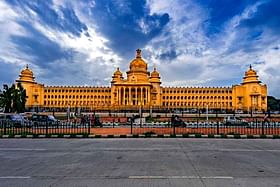Bengaluru is the only city in India where the demand for resources exceeds the supply. According to the authors, the urban planning approach can provide a solution to the problem of insufficient public infrastructure in Bengaluru.
The Indian Institute of Management, Bangalore (IIMB), and the Confederation of Indian Industry (CII) have released a report called ‘Karnataka@100: A Vision Document for 2047’.
According to the report, local governance must be strengthened, physical and social infrastructure upgraded, and public and private spending on education, as well as research and development (R&D), increased to achieve that vision.
The report has identified and delved into 14 different themes that are crucial for the development of Karnataka.
These themes include the entrepreneurial ecosystem, investments in education and skill development, affordable and universal healthcare, tourism, hospitality and sports, as well as the promotion of a green ecosystem, among other things.
Each of these areas merits attention and comprehensive planning to ensure that Karnataka becomes a thriving state with sustainable growth.
The report was co-authored by four professors from IIMB, while Rishikesha T Krishnan, the Director of IIMB, and others have also contributed to it. The collaboration of experts in various fields has made the report a well-rounded and comprehensive approach to finding solutions to the challenges that lie ahead.
Even after India’s independence in 1947 and the liberalisation of the economy in 1991, Karnataka has continued to show extraordinary socio-economic progress. From coffee to IT, the state has established itself globally. However, this also brings about certain unique challenges.
Jitamitra Desai, a co-author of the report and faculty in Decision Sciences, says that the lofty economic growth needs to be addressed with strategic planning.
Prateek Raj, faculty in Strategy, suggests that in the 21st century, Karnataka must tap into its strengths in innovation, entrepreneurship, biodiversity, and heritage to achieve a path of equitable and harmonious growth.
The key is to have a green ecosystem at its core, which will set a benchmark for the world, especially the global South. He strongly believes that Karnataka has the potential to take on such global leadership today.
The authors emphasised the need for directly elected Mayors who would be capable of making decisions regarding the allocation of funds and other related matters. This, along with the strengthening of local bodies, could lead to some degree of decentralisation in the system.
Even if not implemented in Bengaluru, the authors suggested that this approach could be tried out in other cities such as Hubballi-Dharwad. Additionally, to ensure greater accountability and transparency, it’s important to establish more effective measures in the system.
Bengaluru is the only city in India where the demand for resources exceeds the supply. According to the authors, the urban planning approach can provide a solution to the problem of insufficient public infrastructure in Bengaluru.
This calls for better planning which should be driven by an understanding of the city’s unique needs and requirements. By properly analysing this information, urban planners can come up with more effective solutions to the issues currently faced by Bengaluru.


